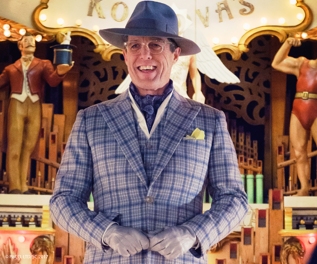Directed by Paul King. Starring Ben Whishaw, Hugh Bonneville, Sally Hawkins, Brendan Gleeson, Julie Walters and Hugh Grant.

What could possibly go wrong?
Paddington has now settled into life with the Brown family, and has become popular with all his neighbours, with the notable exception of Mr Curry (a returning Peter Capaldi at his most grumpy). With his Aunt Lucy’s 100th birthday on the horizon Paddington sets his sights on buying her a present and he’s seen just the thing, a popup book of London. The trouble is it’s expensive, so Paddington takes a series of jobs to save up what he needs.
Unfortunately someone else has taken a shine to the book, an egotistical and once famous actor named Phoenix Buchannan (Grant). When the book is stolen all the evidence points to a bear with a love of marmalade sandwiches. Can Paddington clear his name, and will he be able to get Aunt Lucy the birthday present she deserves?
When Paddington burst onto the scene in 2014 it took everyone by surprise. When talk of a live action Paddington film first appeared it was met with unease, we’d all seen too many beloved characters given the big budget movie treatment and sink without a trace to imagine Paddington would be any different. But of course the film blew everyone away with it’s wonderful casting, amazing special effects and a perfectly pitched family friendly tone. It was no surprise there’d be a sequel, but you can’t catch lightning in a bottle twice, can you?
Well it turns out you can when it comes to small Peruvian bears with a taste for orange based preserves. In pretty much every way possible Paddington 2 is as good as Paddington was; that true rarity, a family film for all ages that doesn’t patronise a single member of its audience. This isn’t a film that throws in a few mature jokes for the adults, or dumbs down its plots for the little uns.
As before the living beating heart of the film is Paddington himself, a perfect combination of wonderful CGI and Ben Whishaw’s spot on characterisation. He plays Paddington like a child, only a child with an old soul, always seeing the good in people, always wanting to be kind, yet never remotely a fool. It’s a tough tightrope to walk but yet again the filmmakers manage it with ease.

If you think there’s a lot of people crammed in here, wait till you see the opposite booth!
Whishaw aside the film is a veritable who’s who of British light entertainment in minor roles, and once again Bonneville is more than happy to play the ever so slightly bumbling straight man to Paddington, his family, and much of the supporting cast. Sally Hawkins plays Mrs Brown with steely resolve, as Paddington’s most vocal supporter. It is a shame the Brown kids and Julie Walters as Mrs Bird don’t get a little more to do, but they do get their moments at least.

Yes it’s a role he was born to play!
Threatening to steal the show are two newcomers in Gleeson as Nuckles McGinty, a crotchety prison cook whose menu is a crime against cuisine, and Grant, hamming it up for all he’s worth as the washed up Buchannan. Grant in particular is marvellous, and in many respects a more engaging villain than Nicole Kidman was first time around, if only by virtue of not being quite so villainous. (oh and a tip for you, please PLEASE stay for the end credits!)
The script is razor sharp, and the humour works on every level, from clever homages (The Untouchables and even Casino Royale) to broad slapstick worthy of Buster Keaton, which is saying something given much of the slapstick is computer generated, but then it never feels like it because Paddington feels so real, you kinda forget he’s not really there.
There’s action aplenty, and set pieces that wouldn’t look out of place in a Bond film, but at the centre of it all is a heart of pure gold and a lovely message about kindness and acceptance, and if it doesn’t remotely tug at your heartstrings then you must have a heart of stone, certainly I shed a tear or two at the end.

You don’t see many family friendly gritty prison dramas…
Oh and I almost forgot the wonderfully whimsical design of the film that blends live action with cartoons and a wonderful scene set entirely within a pop-up book. Setting aside everything the film does right, it looks bloody gorgeous into the bargain!
Beautiful to look at, action packed, laugh packed, with wonderful performances from all concerned and a strong central message about tolerance, Paddington 2 is the epitome of a film for all ages. Some may sneer at it faux multicultural and middle-class England where even hardened criminals are thoroughly nice chaps really, but you know what? with Brexit, Trump and all manner of other nastiness in the world, give me Paddington’s brand of niceness any day of the week.
Highly recommended! Now don’t tell me you hate it unless you want me to give you a very hard stare.

Eventually Paddington realised he was naked!








